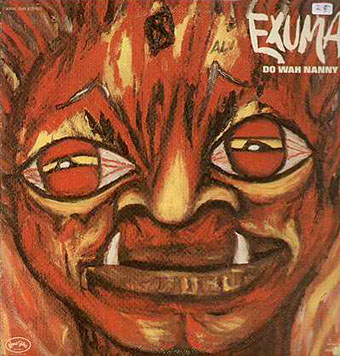
Do Wah Nanny by Exuma (Kama Sutra LP, 1971).
I came down on a lightning bolt
Nine months in my Mama’s belly.
When I was born, the midwife scream and shout,
I had fire crystals coming out of my mouth.
I’m Exuma, I’m the Obeah Man!
So you’ve listened to Dr John‘s Gris-Gris over and over and become addicted to its swampy, voodoo-inflected psychedelia. Where to go next? Dr John’s subsequent career isn’t much help even though he dallied with voodoo themes on his next couple of albums; nothing there quite achieves the distinctive flavour (dare we say “gumbo”?) of his first album. Praise Dambala, then, for Exuma, whose career was launched on the back of Dr John’s success but who often manages to sound more “authentic” (whatever that means) than the New Orleans maestro. These are recording studio confections so authenticity doesn’t really enter into it even though both artists strive to sound like feathered and beaded voodoo-priests lifting the curtain on their spooky rituals.
Screamin’ Jay Hawkins was one of the first to go this route in the 1950s, albeit in a more comical fashion, with I Put A Spell On You (1956) and the very swampy Alligator Wine (1958). The latter wasn’t written by some chicken-sacrificing Baron Samedi but by Leiber and Stoller, a pair of Jewish boys in New York City. Mac Rebennack also started out doing rock’n’roll novelty records, among them Bad Neighborhood by Ronnie & the Delinquents and Morgus The Magnificent by Morgus & the 3 Ghouls. His new persona of Dr John (full designation: Dr John Creaux, the Night Tripper) was taken wholesale from Robert Tallant’s Voodoo in New Orleans (1946), a book which features a chapter detailing the exploits of the original voodoo chieftain of that name, and whose text includes a number of the songs and chants (including the classic I Walk on Guilded Splinters) adapted by Rebennack for Gris-Gris. His debut album sounds like it was recorded in some deconsecrated church in a New Orleans swamp but was actually created between very mundane pop sessions at Phil Spector’s Los Angeles studio with other session musician friends. Which brings us to Exuma. But who was Exuma? Perfect Sound Forever asked the same question:
Who was Exuma?
• He was a spirit who came from a planet, now extinct, brought to us on a lightning bolt, who had communed with Charon, the ferryman of the River Styx and Vodun priests. When he informed the world of his travels and even warned of Armageddon, he left the Earth, perhaps tiring of the corporeal and moving to the ethereal.
• He was born McFarlane Anthony McKay on Cat Island in the Bahamas in the early 1940’s. He then relocated to New York, to study architecture at the age of 17. He ran out of money for his studies and in 1962, participated in folk music hootenannies. Gaining confidence, he started a group called Tony McKay and the Islanders. He also was in a show called A Little of This ’n’ That in 1965, along with Richie Havens.
• He was a marketing nightmare. Who knew how to peg him? Finding his records has never been an easy task. Often, through dint of color, he was placed in the Soul or R&B bin, even though his music, while soulful, does not belong in either. When his first album was released in 1970, there were sections for music of other countries, however, since he lived in New York and recorded for Mercury, it may have looked out of place there. His music was not Ska or Reggae. He was a contemporary of Bob Dylan’s and Peter Paul and Mary, even playing the Café Wha? and the Bitter End in Greenwich Village, but his music wasn’t quite from the same branch of Folk singing as Dylan, Woody Guthrie or Ramblin’ Jack Elliott. His albums couldn’t be placed in Rock; besides, who would get it if it was put there?
All of the above answers are, in varying degrees, “correct.”
Continues here. Typically with fugitive culture of this kind there isn’t much information around but there’s another appreciation of Exuma’s talents here. As with much black music there’s a political dimension also, despite the magickal doodlings. On Fire in the Hole from the second album, Exuma sings “You can’t build a nation off of bloodshed and expect the blood not to stain the land.” The reference originally would have been to the Vietnam War but that line and others can’t help but have a resonance today.
McFarlane Anthony McKay left the planet Earth in 1997 but happily his early albums are all available on CD. If you’re feeling unfulfilled by current servings of musical minestrone get yourself down to the swamp for a dose of gumbo, authentic or not.
Exuma (LP Mercury 1970, CD TRC 1993)
Exuma II (LP Mercury 1970, CD TRC 1993)
Do Wah Nanny (LP Kama Sutra 1971, CD Castle 1993)
Snake (LP Kama Sutra 1972, CD Castle 1993)
Reincarnation (LP Kama Sutra 1972, CD Castle 1993)
Life (LP Buddah 1973, CD Castle 1993)
Penny Sausage (Inagua 1980)
Going to Cat Island (??)
Universal Exuma (??)
Rude Boy (ROIR 1986) (originally released as Street Life)
Previously on { feuilleton }
• Metabolist: Goatmanauts, Drömm-heads and the Zuehl Axis
• A playlist for Halloween
• Ghost Box
• Voodoo Macbeth
• Davy Jones

One thought on “Exuma: Obeah men and the voodoo groove”
Comments are closed.